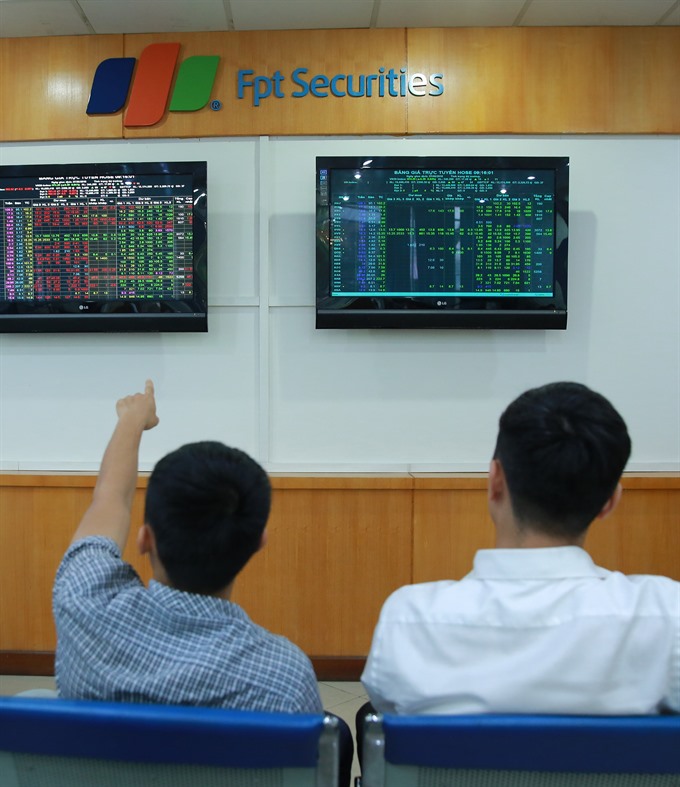Covered warrants is a new investment tool that on the face of it, appears to be an effective hedging and investment instrument.
 Covered warrants is a new investment tool that on the face of it, appears to be an effective hedging and investment instrument.— VNS Photo Truong Vi
Covered warrants is a new investment tool that on the face of it, appears to be an effective hedging and investment instrument.— VNS Photo Truong ViCovered warrants is a new investment tool that on the face of it, appears to be an effective hedging and investment instrument.
It offers lower investment costs and higher leverageability than conventional financial products, and expects to help investors limit losses and make higher profit.
Covered warrants were allowed to start trading on the HCM Stock Exchange in Q3, beginning this month.
It is the fourth product traded on the HCM City’s bourse, together with stocks, bonds and fund certificates.
The new product is expected to provide investors with more investment and hedge options, while helping draw foreign investment as there is no cap on foreign ownership of this product.
Covered warrants, issued by a securities company, allow the holder to buy (call warrant) or sell (put warrant) the underlying stock (including shares, bonds or other securities) at a specific price on or before a pre-determined date.
As many as 10 securities companies will issue covered warrants, including SSI, HSC, VND, VCI, MBS, BSC, VDSC, CTS, KBSV and VPBS. Among them, a few companies have announced the stock code names, scheduled to be issued.
VNDirect Securities Company (VND) has selected the first four conventional stocks to issue covered warrants, namely FPT, HPG, MBB and SSI.
VND plans to issue covered warrants with a conversion ratio of 4:1 for the two stocks of FPT and HPG and 3:1 ratio for MBB and SSI. Each cover warrant is expected to fetch between VND1,000 - 2,500.
According to VNDirect, these are blue-chips with large capitalisation, high liquidity, helping traders limit risk.
Meanwhile, SSI has chosen three underlying shares which are MBB, FPT, and HPG.
BIDV Securities Company (BSC) also plans to issue two covered warrants of REE and SSI in August.
Reduce losses
Vietnamese stock market has fallen deeply since reaching the peak of more than 1,200 points in April, so far the VN-Index just stands around 900 points.
Many investors are facing big losses. However, they might have been limited if covered warrants products were put into operation sooner, analysts say.
Covered warrants are structured as a derivative and has leverage, low transaction cost, short life cycle, which is welcomed by individual investors due to its superiority of profitability and risk control.
The initial cost to buy is only small, about 10 per cent of the value of underlying stock, so investors can achieve the equivalent price fluctuation rate as the initial rate of those basic shares and the leverage will increase profitability for investors.
During the validity period of covered warrant, if the underlying stock price moves higher as expected, the investors will earn a huge profit.
The underlying stock of REE has a market price of VND30,000 (US$1.3) per share but BSC issues covered warrants of REE at only VND1,500-3,000 per unit.
If investors buy, they only lose a maximum amount of VND3,000 per unit. If they buy the underlying stocks, they will suffer higher losses when the stock price drops below VND27,000 per share.
If a product has high leverage, it will be a greater risk. In addition to raising profit, the leverage of covered warrants can also raise the damage rate when price of underlying stock shifts in an opposite direction to investors’ expectations, analysts say.
In January this year the SSC issued Decision No 72/QD-UBCK, regarding guidelines on the sale and risk prevention of covered warrants.
The decision, taking effect from January 18, states that covered warrants trading in Viet Nam will follow the European model and payment must be made in cash.
It also states the covered warrant products will be large-cap stocks listed on the VN30 and the HNX30 indices, as they meet requirements on market capitalisation, trading liquidity, and the percentage of free-float shares.
The trading of covered warrants is similar to that of stocks, as investors are allowed to use their stock trading accounts to buy and sell covered warrants.
As of mid-2017, only ten candidates among more than 70 securities companies in Viet Nam met the requirements to sell warrants, including charter capital and equity capital of at least VND1 trillion.
These companies must not have incurred cumulative losses and must have fully licensed securities operations. Of those, only four securities companies had shareholder approval to issue warrants in 2017.
Currently, some 23 stocks in the VN30-Index are qualified to be underlying stocks of covered warrants. Such stocks meet requirements in terms of market capitalisation of more than VND5 trillion, sufficient liquidity and free-float and decent business performance. — VNS
- Tags
- Covered warrants
- HOSE
- HNX
- shares





